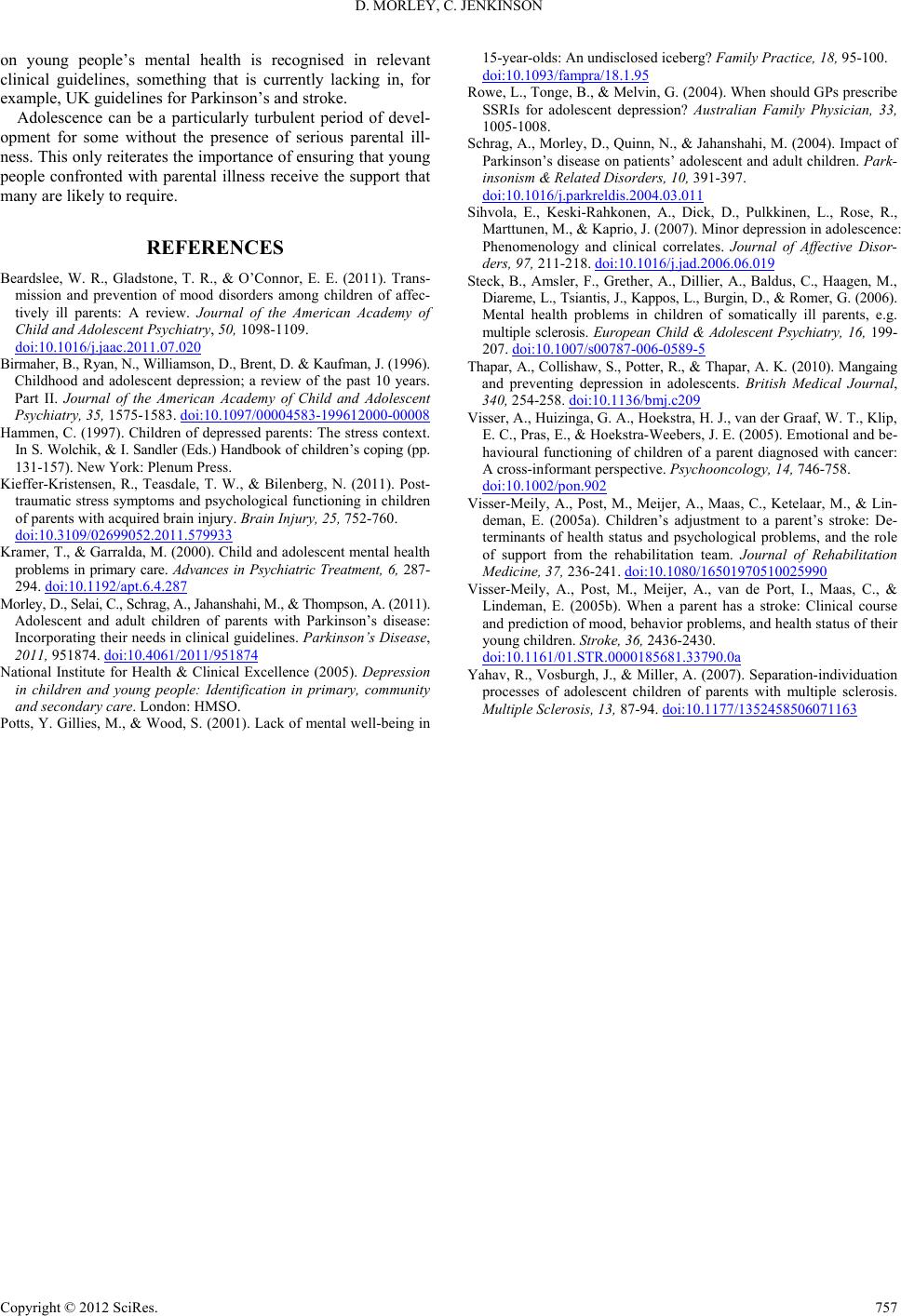
D. MORLEY, C. JENKINSON
on young people’s mental health is recognised in relevant
clinical guidelines, something that is currently lacking in, for
example, UK guidelines for Parkinson’s and stroke.
Adolescence can be a particularly turbulent period of devel-
opment for some without the presence of serious parental ill-
ness. This only reiterates the importance of ensuring that young
people confronted with parental illness receive the support that
many are likely t o requir e.
REFERENCES
Beardslee, W. R., Gladstone, T. R., & O’Connor, E. E. (2011). Trans-
mission and prevention of mood disorders among children of affec-
tively ill parents: A review. Journal of the American Academy of
Child and Adolescent Psychiatry, 50, 1098-1109.
doi:10.1016/j.jaac.2011.07.020
Birmaher, B., Ryan, N., Williamson, D., Brent, D. & Kauf man, J. (1996).
Childhood and adolescent depression; a review of the past 10 years.
Part II. Journal of the American Academy of Child and Adolescent
Psychiatry, 35, 1575- 1583. doi:10.1097/00004583-199612000-00008
Hammen, C. (1997). Children of depressed parents: The stress context.
In S. Wolchik, & I. Sandler (Eds.) Handbook of child ren’s coping (pp.
131-157). New York: Plenum Press.
Kieffer-Kristensen, R., Teasdale, T. W., & Bilenberg, N. (2011). Post-
traumatic stress symptoms and psychological functioning in children
of parents with acquired brain inju ry. Brain Injury, 25, 752- 760.
doi:10.3109/02699052.2011.579933
Kramer, T., & Garralda, M. (2000). Child and adolescent mental health
problems in primary care. Advances in Psychiatric Treatment, 6, 287-
294. doi:10.1192/apt.6.4.287
Morley, D., Selai, C., Schrag, A., Jahanshahi, M., & Thompson, A. (2011).
Adolescent and adult children of parents with Parkinson’s disease:
Incorporating their needs in clinical guidelines. Parkinson’s Disease,
2011, 951874. doi:10.4061/2011/951874
National Institute for Health & Clinical Excellence (2005). Depression
in children and young people: Identification in primary, community
and secondary care. London: HMSO.
Potts, Y. Gillies, M., & Wood, S. (2001). Lack of mental well-being in
15-year-olds: An undisclosed i ce b erg? Family Practice, 18, 95-100.
doi:10.1093/fampra/18.1.95
Rowe, L., Tonge, B., & Melvin, G. (2004). When should GPs prescribe
SSRIs for adolescent depression? Australian Family Physician, 33,
1005-1008.
Schrag, A., Morley, D., Quinn, N., & Jahanshahi, M. (2004). Impact of
Parkinson’s disease on patients’ adolescent and adult children. Park-
insonism & Related Disorders, 10, 391-397.
doi:10.1016/j.parkreldis.2004.03.011
Sihvola, E., Keski-Rahkonen, A., Dick, D., Pulkkinen, L., Rose, R.,
Marttunen, M., & Kaprio, J. (2007). Minor depression in adolescence:
Phenomenology and clinical correlates. Journal of Affective Disor-
ders, 97, 211-218. doi:10.1016/j.jad.2006.06.019
Steck, B., Amsler, F., Grether, A., Dillier, A., Baldus, C., Haagen, M. ,
Diareme, L., Tsiantis, J., Kappos, L., Burgin, D., & Romer, G. (2006).
Mental health problems in children of somatically ill parents, e.g.
multiple sclerosis. European Child & Adolescent Psychiatry, 16, 199-
207. doi:10.1007/s00787-006-0589-5
Thapar, A., Collishaw, S., Potter, R., & Thapar, A. K. (2010). Mangaing
and preventing depression in adolescents. British Medical Journal,
340, 254-258. doi:10.1136/bmj.c209
Visser, A., Huizinga, G. A ., Hoekstra, H. J., van der Graaf , W. T., Klip ,
E. C., Pras, E., & Hoekstra-Weebers, J. E. (2005). Emotional and be-
havioural functioning of children of a parent diagnosed with cancer:
A cross-informant perspective. Psychooncology, 1 4 , 746-758.
doi:10.1002/pon.902
Visser-Meily, A., Post, M., Meijer, A., Maas, C., Ketelaar, M., & Lin-
deman, E. (2005a). Children’s adjustment to a parent’s stroke: De-
terminants of health status and psychological problems, and the role
of support from the rehabilitation team. Journal of Rehabilitation
Medicine, 37, 236-241. doi:10.1080/16501970510025990
Visser-Meily, A., Post, M., Meijer, A., van de Port, I., Maas, C., &
Lindeman, E. (2005b). When a parent has a stroke: Clinical course
and prediction of mood, behavior problems, and health status of their
young children. Stroke, 36, 2436-2430.
doi:10.1161/01.STR.0000185681.33790.0a
Yahav, R., Vosburgh, J., & Miller, A. (2007). Separation-individuation
processes of adolescent children of parents with multiple sclerosis.
Multiple Sclerosis, 13, 87-94. doi:10.1177/1352458506071163
Copyright © 2012 SciRes. 757